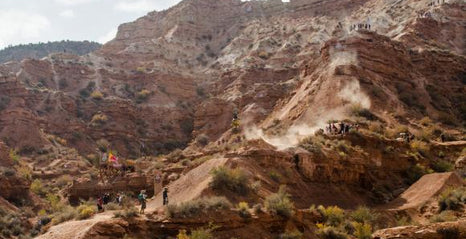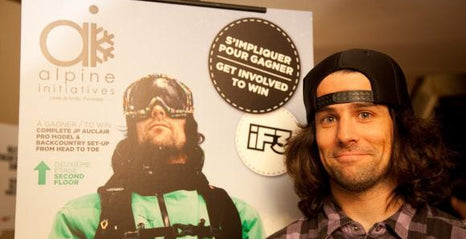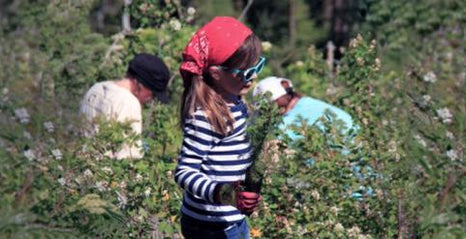Interview With Director Grant Baldwin of Just Eat It
How did the idea for the movie come about?
From our last film, we would go to a lot of schools and present on zero waste. One of the schools asked us to do a waste audit. So basically they asked us to take one of their garbage cans and pour it out in front of us and sort out what they could have recycled. So we poured it out and we were sorting everything into these piles of paper, plastic and metal but there was this category we didn’t have a name for and it was uneaten perfectly sealed up food. Kids were throwing out pudding cups, granola bars and fruit and all of the stuff they didn’t want in their lunch and that sort of stopped us in our tracks because we didn’t have a category for that and so we decided that would be our next topic. And at the same time a report came out from Guelph, Ontario that 40% of food is wasted so we wanted to look into it further.
What was a typical day like living off of food waste?
We’d look every couple days just like going grocery shopping basically. But it got to a point where we would have surplus and people were coming to our house and we were giving them food. We actually had the same problem as the wholesalers. We had a surplus amount of food and it would only be good for a certain amount of time and then we’d have to get rid of it. So instead of tossing it, we were donating it. We did find some stuff that was bad. I think maybe 3% of the time we’d find something that legitimately had gone off and we’d just compost it.
What was the worst thing you ate from the dumpsters?
There was some milk in there and it was 17 days past the date label and it was fine actually. I had cereal and everything was okay and nothing totally disgusting happened because it’s pretty obvious when you open something. But honestly the majority of what we found was fine. Nothing was disgusting or moldy, because it’s not food scraps. The majority of what we were finding was packaged foods that you buy at Whole Foods, because a lot of places where we were finding stuff was from an organic supplier. So we were finding things that people spend like $7 a pack on. It wasn’t gross in any sense. We still have food in our house. There’s still food here to give away!
What was your best score from the dumpsters?
Our best score was 15,000 dollars worth of organic chocolate bars. We gave out the majority of them. We gave them to my friend Frank Wolf who attempted to ride the North West passage. I gave them 50 lbs of chocolate which the team ate all of. So I feel like I was partly responsible for powering that trip.
What’s the biggest takeaway message you hope people will get from the film?
For us the most shocking part was that even though we were pointing fingers at industry and they are wasting so much food, when you look at the food waste reports, half of the food wasted is on our side, the consumer side, so what we do in our houses and how we behave at restaurants and when we eat out. And so that was shocking to see. So I think in the end we just want people to value food and go back to what my granddad tried to pound in to me and you know; ‘you don’t know what it’s like to live through a war and what it’s like to have to ration sugar’. Just to start eating what we buy and what we need.
That’s a great message because we do tend to over-consume. So how does this over-consumption relate to our health? Do you think there’s any conflict with that because a lot of packaged food that we are throwing away and wasting isn’t necessarily healthy for us?
We realized a lot of these things are connected. Eating healthy and wasting less food is connected in the sense that when we signed up for our CSA (Community Supported Agriculture), we get a veggie box that we’ve paid for for the entire season and we’re getting that directly from the farmer. So we’ve committed to what we’re getting and also it lasts longer because it’s really fresh. When you think about where our food comes from if it comes from California, it travels a long way, it gets sent to wholesalers and the wholesaler ships it to the stores so by the time we get it a lot of it’s life is gone. When you’re buying local food you’re going to have more time to get through it and also I think by making that investment you’re more likely to eat it because you’re more connected to the source. The other thing I realized is that everyone talks about organic but no one talks about food waste yet. I think food waste is the next conversation because it doesn’t matter how sustainably something is grown if you just toss it away.
Right. And eating locally grown food is naturally going to be healthier.
Exactly. Of course we need staples, but food is a really interesting thing. When we buy things like grain that is put on the world market, rice and oats, all that stuff is a commodity because it has a long shelf life so it can be traded. So when we waste for example wheat off the world market we’re basically driving the price up for third world countries just to buy from that same market because we’re tossing 40% of the bread we make. So when you’re parents told you to finish your plate because of starving kids in Africa, well it is related. It really is related, maybe not your vegetables but definitely the grains and the stuff that is traded. It’s really interesting.
You guys are also avid snowboarders, do you ever feel like your mountain pursuits are in conflict with your sustainability beliefs and values?
The ski culture, when you’re in it you think it’s big because you know everybody is connected in some way, but it’s so tiny in the scale of everything. When you fly over the Salinas Valley and you see the agriculture for just our salad mixes you start to see real scale. A handful of ski resorts in the world are not even a blip on the radar and we’re not going to the ski resort and throwing away 40% of our ski resort everyday. Although we do waste a lot of food there…
But actually ski bums are the best because they’ll eat other peoples leftover food in the ski lodge…
And they’ll eat the condiments because it’s free! But people don’t even understand in some countries what skiing is. Do you know what I mean? Food is everybody, everywhere, all the time.
In your first film, The Clean Bin Project, you and Jen had a competition for who produced the least waste, was there any competition side to this movie?
No, there was no competition. It was more of a team effort. It was actually more of me trying to drag Jen along in this project that she really didn’t want to do. When we started this thing, she only committed to 30 days because we went cold turkey, like we quit grocery shopping cold turkey. It wasn’t the same kind of feeling that we got from Clean Bin. In Clean Bin we felt like we were doing something to help our lifestyle but we realize that dumpster diving is not really helping anything, the food’s already been paid for and tossed. Okay, maybe it stopped the food from going into the landfill, but big deal. The more we saw the harder it was emotionally to see it all. But really, if we didn’t commit to doing this project we wouldn’t have gotten the footage we got. We wouldn’t have been forced to go out at midnight on Sunday to go find some food and then stumble across something that’s only going to be in the dumpster for 5 hours before it gets picked up…Stuff that people just don’t get to see. Because a number doesn’t mean anything, 40% of food wasted, sounds like a lot but what does it look like to show .0001% of that in pile? Then people go ‘whoa’!
What about composting? Is that an easy out?
Compost is great for food scraps but you’re right, we can’t just jump straight to compost. First of all, the majority of the food we’re finding is totally fine and people should be eating it. Date labels are almost fallacy. Second of all we should be feeding livestock because right now we grow soybeans in the amazon to process pellets to feed to pigs in North America and Northern Europe and we’ve got all this surplus food lying around that we could be feeding our livestock with and we wouldn’t have to import anything or cut down more forests. There are people moving towards feeding livestock with food and initiatives that support that but it just seems ridiculous to me. You could even get energy and generate electricity from food waste and then compost is sort of the last step. It’s the least value back.
It’s so interesting. I can’t wait to see the movie. Thanks for your time Grant!
Check out the Behind the Scenes with Just Eat It: A Food Waste full blog post.
By AI Blog contributor: Sarah Frood


